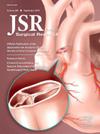改变小儿非粘连性小肠梗阻的治疗模式--我们是否应该手术?
IF 1.8
3区 医学
Q2 SURGERY
引用次数: 0
摘要
导言:越来越多的证据表明,非手术疗法(NOM)治疗小儿粘连性小肠梗阻(A-SBO)取得了成功。然而,人们担心非粘连性小肠梗阻(NA-SBO)患者如果不预先接受手术治疗,会反复发作小肠梗阻。我们研究了非粘连性 SBO 初诊时的 NOM 是否与 SBO 复发风险的增加有关:方法:我们采用当前程序术语/国际疾病分类(ICD)代码和病历审查进行了一项单中心观察性研究。NA-SBO定义为无SBO病史、既往无腹部手术史或已知可导致SBO的先天性胃肠道畸形的患者。我们排除了嵌顿疝和肿瘤患者。自变量是最初入院时的手术治疗,主要结果是1年内SBO复发:我们的队列包括97名患者,其中30名患者(31%)在最初入院时接受了NA-SBO手术治疗。手术组与非手术治疗组在1年内SBO复发率上没有差异(6.7%对8.9%,P=0.70)。在复发的患者中,手术干预的需求没有差异(2/6 对 0/2,P = 0.34)。所有复发手术都不是紧急或急诊手术。非手术治疗患者的中位住院时间较短(2 d 对 7 d,P=0.34):NA-SBO的非手术治疗与SBO复发率增加无关,非手术治疗也不会导致发病率增加。外科医生应考虑对病情稳定的NA-SBO儿科患者实施NOM。本文章由计算机程序翻译,如有差异,请以英文原文为准。
Changing the Paradigm for Managing Pediatric Nonadhesive Small Bowel Obstructions—Should We Operate?
Introduction
Growing evidence supports the success of nonoperative management (NOM) for pediatric adhesive small bowel obstruction (A-SBO). However, there is concern that patients with nonadhesive SBO (NA-SBO) will have repeat episodes of SBO if not treated with surgery upfront. We examined whether NOM of NA-SBO at initial presentation was associated with increased risk of recurrent SBO.
Methods
A single-center observational study was performed using Current Procedural Terminology/International Classification of Disease (ICD) codes and chart review. NA-SBO was defined as SBO in a patient with no history of SBOs, prior abdominal surgeries, or congenital gastrointestinal abnormalities known to cause SBO. We excluded patients with incarcerated hernias and tumors. The independent variable was surgical treatment at initial SBO admission and primary outcome was SBO recurrence within 1 y.
Results
Our cohort included 97 patients, with 30 patients (31%) undergoing surgery at initial NA-SBO admission. There was no difference in rates of recurrent SBO within 1 y when comparing the operative versus nonoperative management groups (6.7% versus 8.9%, P = 0.70). Among patients who recurred, there was no difference in need for surgical intervention (2/6 versus 0/2, P = 0.34). None of the operations for recurrence were urgent or emergent. Patients managed nonoperatively had a shorter median length of stay (2 versus 7 d, P < 0.001) and did not have significantly more emergency room visits (10.4% versus 6.7%, P = 0.55).
Conclusions
NOM of NA-SBO was not associated with increased rates of SBO recurrence, and NOM did not lead to increased morbidity. Surgeons should consider NOM in stable pediatric patients who present with NA-SBO.
求助全文
通过发布文献求助,成功后即可免费获取论文全文。
去求助
来源期刊
CiteScore
3.90
自引率
4.50%
发文量
627
审稿时长
138 days
期刊介绍:
The Journal of Surgical Research: Clinical and Laboratory Investigation publishes original articles concerned with clinical and laboratory investigations relevant to surgical practice and teaching. The journal emphasizes reports of clinical investigations or fundamental research bearing directly on surgical management that will be of general interest to a broad range of surgeons and surgical researchers. The articles presented need not have been the products of surgeons or of surgical laboratories.
The Journal of Surgical Research also features review articles and special articles relating to educational, research, or social issues of interest to the academic surgical community.

 求助内容:
求助内容: 应助结果提醒方式:
应助结果提醒方式:


